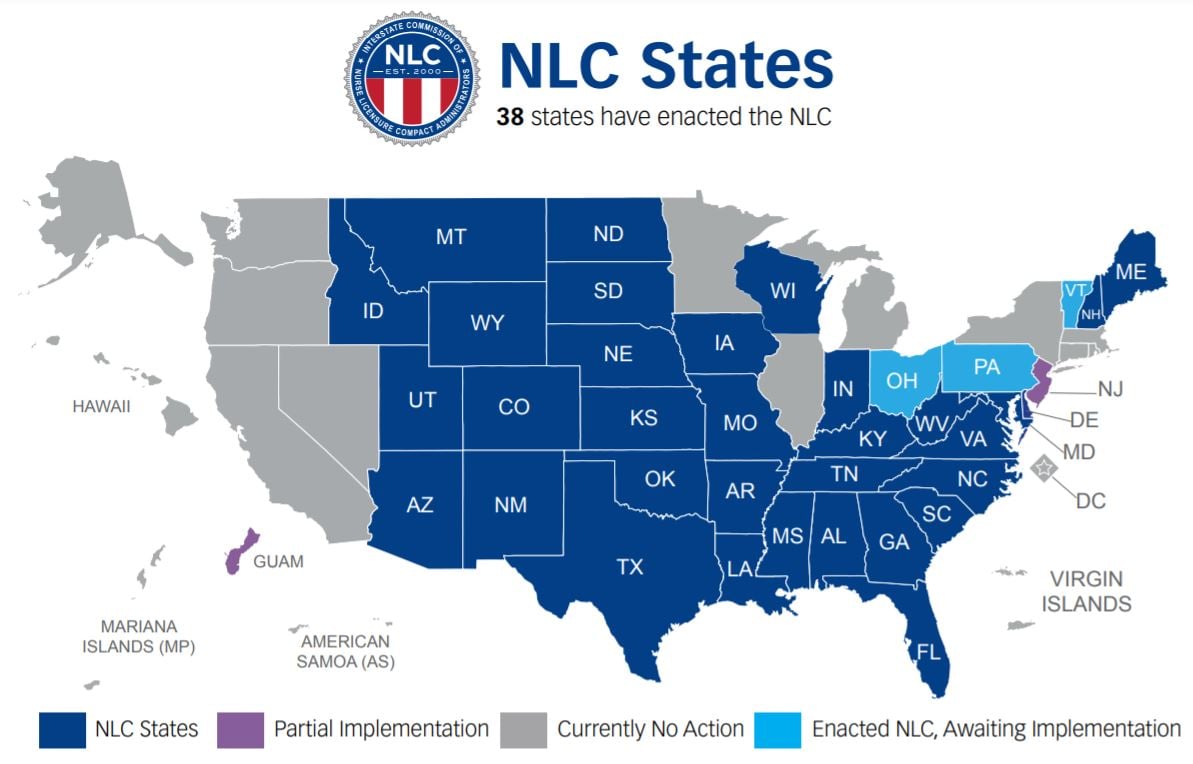LPN/LVN Reciprocity – How to Practice in Another State

Relocating to a different state can be a significant undertaking, involving both physical and mental effort. It’s crucial to ensure that your nursing license undergoes a smooth transfer and that you possess all the necessary documentation before departing your current state.
One of the initial considerations should be understanding how your license will be impacted by the move. While the process is more straightforward than you might think, it may take several months to complete all the necessary steps.

Struggling to meet your deadline?
Get your assignment on LPN/LVN Reciprocity – How to Practice in Another State done by certified MDs and PhDs in the USA. ORDER NOW!
Obtaining an LPN or LVN License In a New State
The first step towards obtaining your LPN license in a new state is submitting an application. Each state has its own website detailing the process of becoming a licensed nurse actively. Locate your state on the National Council of State Board of Nursing website. Once you access your new state’s Board of Nursing website, familiarize yourself with their license transfer process.
Reciprocity and Endorsement
Certain states permit LPNs to work in their jurisdiction without acquiring a new license, a process known as reciprocity. Others require endorsement, where you work as an LPN while your new state assesses specific criteria before issuing you a license. Visit your new state’s Board of Nursing website to understand their specific process.
Regardless, you must have completed an accredited LPN program and passed the NCLEX exam in your previous state to be eligible for reciprocity or endorsement.
The Best Historically Black College or University (HBCU) Nursing Programs in 2024
Nurse Licensure Compact (NLC)
The initial Nurse Licensure Compact (NLC) allowed states to opt into an agreement permitting multi-state nursing licenses. This enabled nurses to provide care in other NLC states in person or via telehealth. Since January 2018, an Enhanced Nurse Licensure Compact (eNLC) has replaced the original NLC. Under the enhanced NLC, nurses can still provide care in other NLC states without obtaining a new license. The eNLC includes additional rules, such as a criminal background check requirement and restrictions for applicants with felony convictions.
Uniform Licensure Requirements for Multi-State Licenses
To be able to have a license to practice nursing in multiple states under the NLC, nurses need to fulfill 11 specific conditions. These conditions are:
1. Fulfill the licensing requirements of their home state.
2. Graduate from an education program approved by the state board or from an internationally approved education program.
3. Pass an English proficiency test if their education was completed internationally or if English is not their native language.
4. Successfully pass the NCLEX-PN exam.
5. Be eligible for or possess an active and unrestricted license.
6. Undergo state and federal criminal background checks.
7. Have no felony convictions at the state or federal level.
8. Have no misdemeanor convictions related to nursing practice.
9. Not be currently participating in an alternative program.
10. If participating in an alternative program, it is mandatory to disclose this information.
11. Hold a valid Social Security number issued in the United States.
It’s important to note that nurses who already had a multi-state license before July 20, 2017, are automatically included in the new agreement. They do not need to meet these requirements unless they decide to move to a different state.
Which States Are In the NLC?
Currently, a majority of states have opted to participate in the NLC. Some states are still pending legislation or implementation to join, while others have not yet joined. Refer to the map below for a clear indication of states actively involved in the NLC, those pending, and those awaiting legislation.

Image Source: https://www.ncsbn.org/nurse-licensure-compact.htm
LPN/LVN License by Endorsement
Getting an LPN/LVN license in a new state, especially if it’s not part of the NLC, involves a process called license by endorsement. This means that practical nurses can obtain an additional single-state nursing license to work in the new state. To do this, LPNs applying for endorsement must meet the eligibility criteria of the new state, typically requiring:
1. Proof of LPN/LVN licensure in your current state.
2. Submission of official transcripts from a nursing program approved by the state.
3. Proof of passing the NCLEX-PN exam.
4. A criminal background check.
Each state’s Board of Nursing provides specific details and additional information on the requirements for LPN licensure by endorsement.
Understanding the LPN/LVN Licensing Requirements by State
It’s crucial to check whether the state you’re moving to participates in the Nursys system. Nursys is a database used for verifying nursing credentials. If your state is part of Nursys, you’ll need to register and pay a $30 fee for each jurisdiction to have your license verified. This is a convenient process that reduces paperwork, but it’s important to note that fees can accumulate as you’ll be paying both your current state and your future state of residence.
Some states may require you to take a practical nursing exam to obtain your license. To avoid delays, it’s advisable to initiate the license transfer process early. This proactive approach ensures a smoother transition, and you can learn more about working as an LPN during this process.

Dont wait until the last minute.
Provide your requirements and let our native nursing writers deliver your assignments ASAP.
